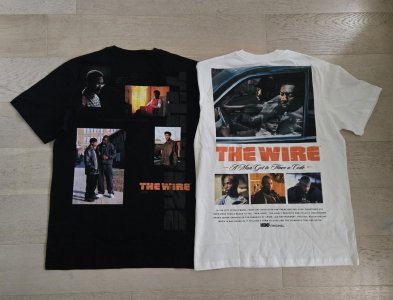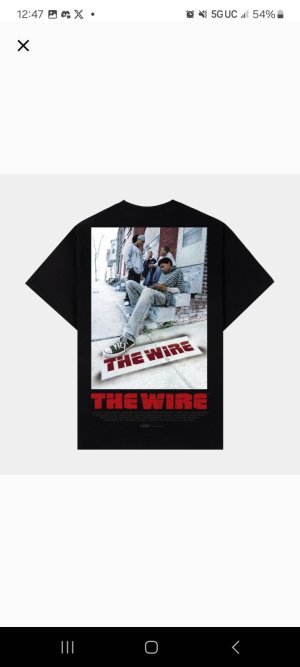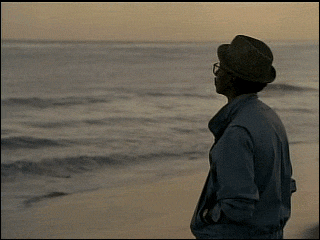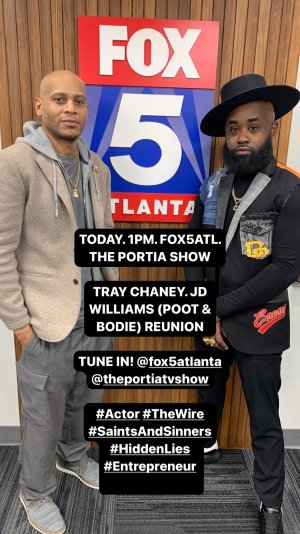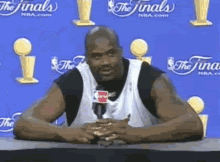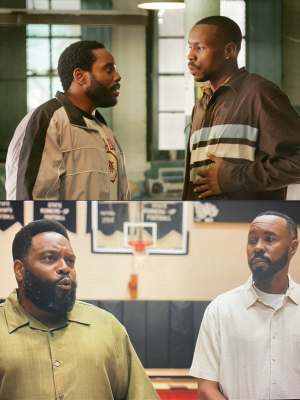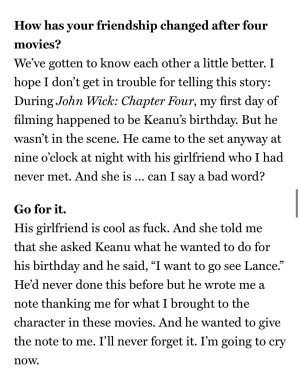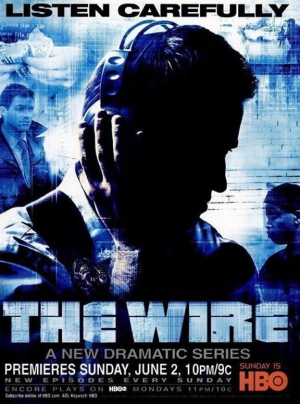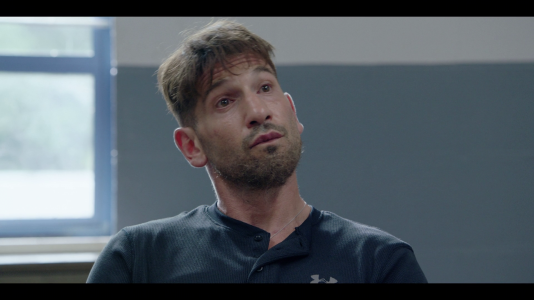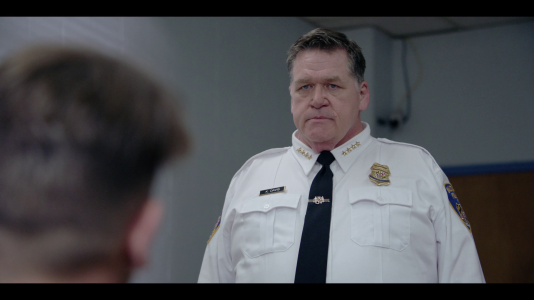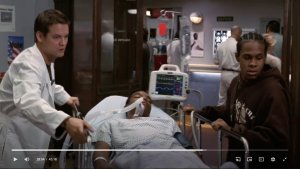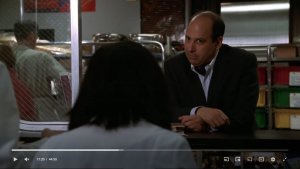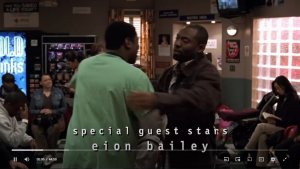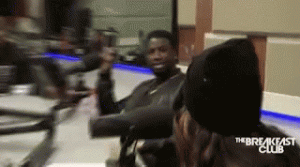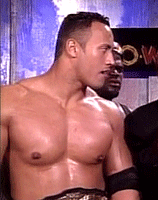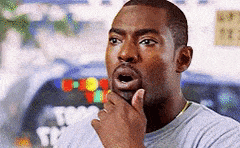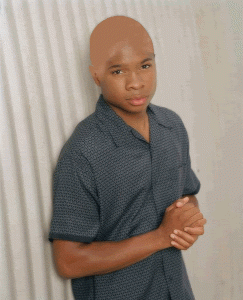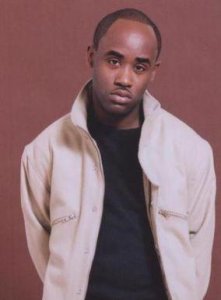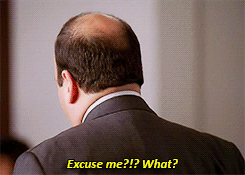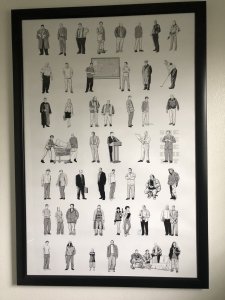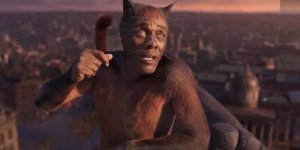One of the signature themes of David Simon's TV series The Wire is the idea that where you come from matters, that class and race are, to a large degree, destiny. The first season mostly framed this idea in terms of race, with black drug dealers from the projects often lamenting the fact that being born into this life gives them so few options. The second season drives home that the real issue is class, by translating this theme to the mostly white, mostly Polish working class guys of the Baltimore dockworkers' union.
In one key scene, union president Frank Sobotka (Chris Bauer) confronts his hired lobbyist Bruce DiBiago (Keith Flippen), contrasting DiBiago's big-money comfort against Frank's own desperation: DiBiago sends his son to Princeton, and says that now the kid can do anything he wants after graduating, a stark contrast against the pathetic life and constant failures of Frank's son Ziggy (James Ransone). DiBiago counters that his own family came from similarly limited circumstances, that his great-grandfather was a struggling working man who wanted more for his own kids, so he made sure they were educated and propelled them towards the better life that has resulted in DiBiago's current success. Frank's not interested in history, though, and he's not interested in thinking so long-term that his great-grandsons might make something of themselves. He wants security — and the dignity of work — for his own kid, something tangible he can see while he's still around.
Frank's story is at the center of this season because he so fully embodies the message that Simon is sending here. Frank is a member of a declining union, working in a harbor that's seeing less and less traffic and thus less and less work for the union members. Repeated scenes throughout the season emphasize how the men of the union come to work everyday not sure if they'll have a job for the day or not. This is particularly true for the younger men, like Ziggy and Frank's nephew Nick (Pablo Schreiber), who are continually passed over for what few jobs there are. They're mostly left to hang around and drink, glowering at the old union hands who tell raucous stories of the good old days. This is a story about obsolescence, about this union — once a powerful political and social force — struggling to survive in a modern political and economic environment that no longer has any respect for the old ways cultivated by the union culture. Frank is trying to adapt — he hires his lobbyist and feeds politicians dirty money he earns by working with the dockside smuggling operation of "the Greek" (Bill Raymond) — but the scene where he tries to charm politicians at a fundraiser demonstrates just how ill-suited the gruff, blunt-force Frank is to the subtleties of modern politics.
Indeed, it's Frank's failure to understand such niceties that more or less kicks off the season's plot. In one of the bitter ironies that runs unstated through the season, Frank comes under investigation not so much because of his genuinely illegal activity but because he dares to purchase a stained glass window at a local church on behalf of his union. It's a point of pride for him, but it's also a point of pride for the high-ranking police major Valchek (Al Brown), who had wanted to donate his own window to the church. Frank's refusal to give in to the politically connected Valchek causes the major to open an investigation into Frank, a frivolous and mean-spirited smear operation that eventually winds up exposing the full and rather surprising extent of Frank's connections to drugs, prostitution and smuggling in the city. Unaware of the investigation, Frank responds to Valchek's harassment by stealing a police surveillance van from Valchek's unit and shipping it around the world, updating the major with Polaroids of the van in various ports. It's the kind of old-school practical joke that Frank and his union buddies might have played in the old days, a silly and stupid prank that here has dire consequences.
At this point, as Valchek gets Lieutenant Daniels (Lance Reddick) to assemble a new squad to investigate Frank, the show flirts with formula as most of the first season's cops return to work with Daniels, dually investigating Frank and the deaths of a cargo container full of European women who had been shipped through Frank's port for the sex trade. The assembling-the-team segments early in the season come off as a warped mirror of the first season, though, since they're not getting together for the high-stakes drug operation of the first season but for what amounts to a personal vendetta. The fact that the operation eventually exposes some very shady activity only reinforces the bitter irony at the core of the show: it's only at the impetus of a petty and insecure ******* that some real policework gets done in the city, almost accidentally, and certainly incidentally for Valchek, who gets more and more annoyed the more his squad discovers large webs of crime around Frank rather than focusing solely on the object of Valchek's wrath.
As in the first season, Simon, along with co-writer and ex-cop Ed Burns and a regular stable of HBO directors, weaves together all these different plots and characters to provide a portrait of the ways in which cops and criminals act as part of an overarching social structure. The drug plot from the first season continues to percolate in the background, too, with the machinations of Stringer Bell, Avon, Omar and others eventually tied into the main plot by the end of the season. As in the first season, things that seem innocuous or small-scale turn out to be connected in surprising ways to much deeper societal currents. In the post-9/11 world, the Greek and his international criminal organization are even connected to the FBI, exchanging information and tips for official favors. Part of Simon's vision here is that in the zeal to fight terrorism, the modern national police infrastructure is proving willing to overlook greater and greater domestic evils to win some small victories against foreign evils. Witness the glee of an FBI counter-terrorism agent when he discovers a cache of Colombian drugs on the Greek's tipoff — is this relatively minor coup worth the information he feeds to the Greek, which allows the mysterious kingpin to kill with impunity, and at one point even gives him key information that leads directly to the death of an informer.
More locally, the criminal malaise of the docks is a reflection of economic changes that have these dockworkers teetering on the brink of irrelevancy. Frank is fighting desperately to get new projects started at the docks, but it seems to be a doomed battle right from the start. The politicians smile and take his money, and so does the lobbyist, but it never really seems plausible that Frank is going to get what he wants, and only he doesn't seem to realize it. Others want to build luxury condos in the area, further shrinking the extent of the formerly solid industrial/labor zone, and it's hard to imagine that the big real estate companies won't ultimately have more sway than Frank's declining union, even with all the ill-gotten money he's throwing around. At one point, Frank goes to an informational presentation about new technology that seems like it will largely make dock work an almost human-free occupation. The presenter makes a virtue of the fact that the new setup will reduce injuries, but Frank grasps the unspoken subtext: no one will get injured because almost no one will even be working there.
That's the flipside of the unceasing ethic of "progress" driving this society: there's a constant drive to move forward, with no thought for those inevitably left behind, the Sobotkas of the world. The show portrays the docks as a wasteland in the making, poised between the old way, as represented by Frank's hard-working, hard-drinking generation, and a new way where there's little room for much human presence at all, and certainly not for unskilled laborers like Nick and Ziggy. The dehumanized, mechanized docks of the future are contrasted against the fun-loving older generation, who are always at the bar telling alternately hilarious and harrowing tales of the old days. Their camaraderie and bonhomie in the face of the danger of their profession recalls Howard Hawks Only Angels Have Wings except that now all their male bonding and tough guy posturing takes place in a context where it's clear that this familial, tight-knit spirit belongs exclusively to the past. There will be less danger in the future — no more accidents like the one that crushes one man's leg — but also no more of that closeness and humor, no more of the touching togetherness that's displayed when the entire union shows solidarity for their injured brother, who faces his fate with courage and humor. The younger generation replaces that bold, positive attitude with the bitterness and hopelessness of Nick and Ziggy, the latter of whom is a heartbreaking ****-up who responds to the obvious desolation of his prospects with a casual nihilism, embracing his status as a living punchline.
Frank sees that the next generation, including his own son and his beloved nephew, is not going to have anything waiting for them, which is why Nick still lives in his parents' basement and is forced to steal in order to have any hope of starting a life with his girlfriend. In a different way from the drug dealers of the first season, Nick has been born into a life that doesn't hold much in the way of prospects for him. He could've gotten out of there, gone to college, tried to find work elsewhere, but that seems like as much a dream to him as it had to the first season project drug dealers. He doesn't have any examples of that happening; the American Dream of bettering oneself always seems so remote and abstract from the vantage point of lower-class and working-class characters like Nick.
The situation of this season perhaps pointedly recalls the Marlon Brando classic On the Waterfront which was similarly about corruption and crime on the docks, as well as the day-by-day struggle of working men fighting for a limited number of jobs. But there's no romantically redeemed Brando character here, no one who actively fights the corruption. And the conclusion is similarly hopeless. As in the first season, the last episode ends with a montage that shows everything continuing as before, the whole unstoppable cycle churning on despite the few minor bumps in the road presented by the police investigation and subsequent tumult.
These endings are perhaps the key to the show's brilliance. Even more than in the first season, when at least most of the major drug players had to pay some cost, there's no tidy wrap-up here, no moralistic coda, no satisfying dispensation of justice. Instead, the drugs continue to flow, new boatloads of impoverished women are smuggled into the country to pleasure rich men, while the men in charge evaporate from view and those few who were arrested are replaced almost immediately by new faces. Most poignantly, this montage speeds up towards the end with whiplash-quick visits to various dockside locales, all devoid of people, crusted in rust, as though the area has already been depopulated, turned into the ghost town it's destined to become.









